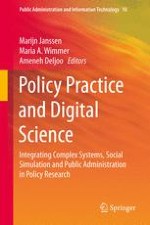2015 | OriginalPaper | Buchkapitel
3. The Quality of Social Simulation: An Example from Research Policy Modelling
verfasst von : Petra Ahrweiler, Nigel Gilbert
Erschienen in: Policy Practice and Digital Science
Aktivieren Sie unsere intelligente Suche, um passende Fachinhalte oder Patente zu finden.
Wählen Sie Textabschnitte aus um mit Künstlicher Intelligenz passenden Patente zu finden. powered by
Markieren Sie Textabschnitte, um KI-gestützt weitere passende Inhalte zu finden. powered by
